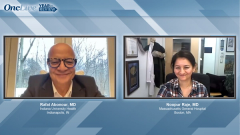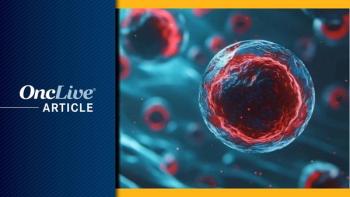
CIBMTR Registry and CARTITUDE-2: Trial of Cilta-Cel in Patients with MM
Dr. Abonour and Dr. Raje provide an overview of the results that were presented at ASH 2023 of the CIBMTR registry and CARTITUDE-2 trial which was the study of ciltacabtagene autoleucel (cilta-cel) in patients with MM and 1-3 prior lines of therapy (Cohort A) and with early relapse after first line treatment (cohort B).
Episodes in this series

This is a video synopsis/summary of an OncLive® Post-Conference Perspectiveinvolving Rafat Abonour, MD, and Noopur Raje, MD.
Abonour and Raje discuss additional B-cell maturation antigen (BCMA)–targeted chimeric antigen receptor (CAR) T-cell therapy data in relapsed/refractory multiple myeloma presented at the 2023 American Society of Hematology Annual Meeting and Exposition.
Abonour reviews results from a large real-world data set of patients treated with idecabtagene vicleucel (ide-cel) from the Center for International Blood and Marrow Transplant Research (CIBMTR) registry. Despite high-risk features and comorbidities that would have excluded most patients from clinical trials, response rates were consistent with those in KarMMa and KarMMa-3 trials. Ide-cel demonstrates reproducibility across phase 3 and real-world data.
Pivoting to earlier lines of therapy, Raje highlights findings from the CARTITUDE-2 trial evaluating cilta-cel in patients after 1 to 3 prior lines of therapy. Deep responses were observed, with complete remission of 90% in both cohorts. However, some concerning neurotoxicity signals emerged, including delayed parkinsonism in some patients. This will be important to monitor as CAR T-cell therapy moves earlier into the treatment paradigm.
In conclusion, Abonour and Raje say they are encouraged by the latest BCMA CAR T-cell data but recognize the need to closely track safety, especially with earlier use.
Video synopsis is AI-generated and reviewed by OncLive® editorial staff.




































